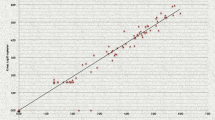Abstract
Background:
Due to the establishment of the National Access to Antiretroviral Program for People who have AIDS (NAPHA), approximately 80,000 Thai HIV-1 infected patients received antiretroviral drugs through the NAPHA program, which was completed at the end of 2005. The development of drug resistance is required for access to ARV drugs. The objective of this study was to determine the prevalence of antiretroviral drug resistance in Thai HIV-1 treated individuals after completing the NAPHA program.
Patients and Methods:
Viral genotypic resistance testing was carried out for 1,880 HIV-infected patients experiencing treatment failure, who enrolled during 2000–2005. All patients were in a follow-up treatment with ARV drugs available in clinical practice. The genotype was performed with the TRUGENE HIV-1 kit to assess resistant mutations to reverse transcriptase inhibitors and to protease inhibitors.
Results:
The frequency of ARV drug resistance has significantly increased after the National Access To Antiretroviral Program was implemented. The reverse transcriptase genes M184V/I (919/1,880; 48.9%) and K103S/H (416/1,880; 22.1%) were the most frequent in nucleoside reverse transcriptase and non-nucleoside reverse transcriptase, respectively. In the protease genes, minor mutations or polymorphisms were found in the majority. Thymidine analogue mutations were presented and increased over time. This study showed a sharp increase in the prevalence of mutations associated with the GPO-VIR combination; nevirapine (948/1,880; 50.4%), lamivudine (889/1,880; 47.3%), and stavudine (703/1,880; 37.4%) after the program was completed.
Conclusion:
With the increased availability of antiretroviral therapy in a resource-constrained country, antiretroviral drug resistance should be closely monitored. HIV-1 drug resistance testing to enable the salvage therapy will remain a priority in Thailand. Furthermore, resistance testing should also become routine before prescribing treatment, and the consequences of continuing to provide a failing regimen must be considered.
Similar content being viewed by others
Author information
Authors and Affiliations
Corresponding author
Rights and permissions
About this article
Cite this article
Sukasem, C., Churdboonchart, V., Chasombat, S. et al. Surveillance of Genotypic Resistance Mutations in Chronic HIV-1 Treated Individuals After Completion of the National Access to Antiretroviral Program in Thailand. Infection 35, 81 (2007). https://doi.org/10.1007/s15010-007-6169-x
Received:
Accepted:
DOI: https://doi.org/10.1007/s15010-007-6169-x



